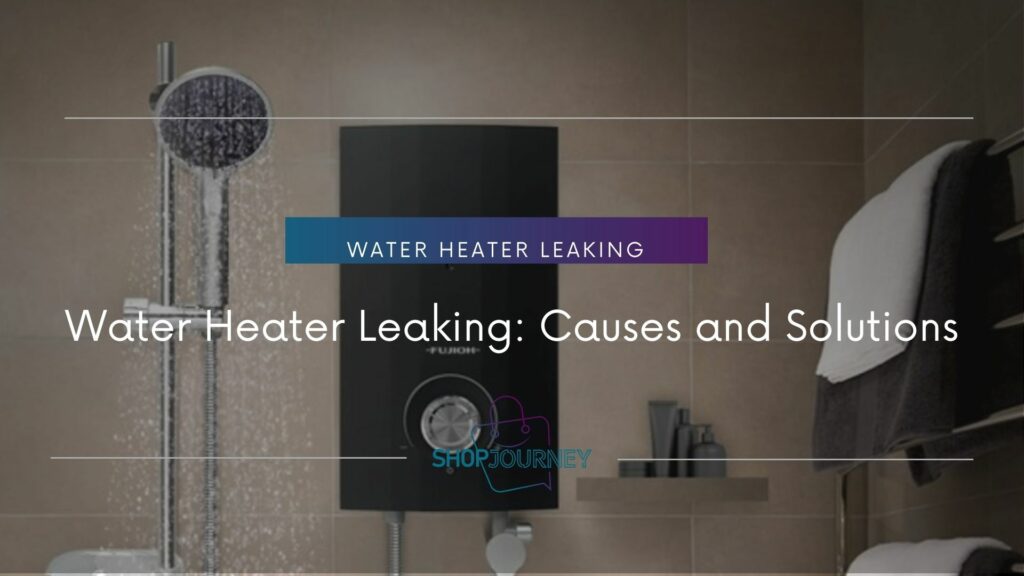Water heaters are crucial for everyday tasks, but a leaking water heater can lead to extensive damage and safety risks. Understanding the causes of leaks, such as loose valves or excessive pressure, is essential for homeowners. In this article, we’ll delve into common reasons for water heater leaks and offer solutions for prevention and repair.
Why Is Your Water Heater Leaking?
Excessive Pressure
One of the most common reasons for water heater leaks is excessive pressure. When the pressure inside the tank becomes too high, it can cause the tank to rupture or the valve to leak. This can be caused by a faulty pressure relief valve, which is designed to release pressure when it becomes too high.
Sediment Buildup
Sediment buildup is another common cause of water heater leaks. Over time, minerals and other debris can accumulate at the bottom of the tank, causing corrosion and rust. This can lead to leaks in the tank or the pipes that connect to it.
Corrosion and Rust
Corrosion and rust are also common causes of water heater leaks. Over time, the tank can corrode and rust, causing small holes to form. This can lead to leaks in the tank or the pipes that connect to it.
Faulty Pressure Relief Valve
A faulty pressure relief valve can also cause water heater leaks. The valve is designed to release pressure when it becomes too high, but if it is not working properly, it can cause the tank to rupture or the valve to leak.
Anode Rod
The anode rod is a component of the water heater that is designed to prevent rust and corrosion. Over time, the rod can become depleted, causing rust and corrosion to form in the tank. This can lead to leaks in the tank or the pipes that connect to it.
Hard Water and Mineral Deposits
Hard water and mineral deposits can also cause water heater leaks. Over time, minerals can accumulate in the tank, causing corrosion and rust. This can lead to leaks in the tank or the pipes that connect to it.
How to Fix a Leaking Water Heater
A leaking water heater can be a major inconvenience and can cause significant damage to your home if not addressed promptly. Here are some steps to take to fix a leaking water heater:
- Turn off the power supply to the water heater. If it is an electric water heater, turn off the circuit breaker that powers it. If it is a gas water heater, turn off the gas supply valve.
- Shut off the cold water supply to the water heater. This valve is typically located near the top of the water heater.
- Drain the water from the tank. Attach a hose to the drain valve at the bottom of the tank and run it to a floor drain or outside. Open the valve and allow the water to drain completely.
- Inspect the drain valve for any damage or leaks. If it is damaged, it will need to be replaced.
- Check the pressure gauge on the water heater. If the pressure is too high, it can cause the tank to leak. If the pressure is above 80 psi, install a pressure-reducing valve.
- Examine the T&P (temperature and pressure) relief valve for any leaks or damage. If it is faulty, it will need to be replaced.
- Confirm that the leak is not coming from the plumbing pipes above the water heater. A drip from above can easily leak down on top of the water heater and even work its way down the insulation and make it look like the leak is coming from the tank itself.
- Clean up any water that has leaked out of the tank and check the outlet connections for any signs of damage or leaks. Tighten any loose connections.
- If the above steps do not fix the issue, it is recommended to call a licensed plumber or professional to fix the water heater.
Can You Still Use a Leaking Water Heater?
A leaking water heater can be a cause of concern for many homeowners. The question on everyone’s mind is whether it is safe to use a leaking water heater. The answer to this question is not a straightforward yes or no.
The first thing to consider is safety. A leaking water heater can pose a safety risk if not handled correctly. According to Angi, running water through a leaking water heater can lead to flooding and gas leaks. It is important to turn off the power supply to the water heater and drain the water from the tank to avoid any further water damage.
However, in some cases, it may be possible to use a leaking water heater on a temporary basis until a professional plumber can repair or replace it. Mister Sewer suggests that homeowners can typically continue to use hot water on a temporary basis while waiting for a plumbing professional. It is important to note that homeowners should not let the leak go unaddressed for an extended period of time as this may lead to premature replacement of the water heater.
It is also important to consider the risk of water damage. A leaking water heater can cause significant water damage to the surrounding area. Homeowners should take precautions to protect their property from water damage by placing a bucket under the leak and turning off the water supply to the water heater.
In summary, a leaking water heater should be taken seriously and handled with caution. Homeowners should prioritize safety and take steps to avoid water damage. While it may be possible to use a leaking water heater on a temporary basis, it is important to have it repaired or replaced by a professional plumber as soon as possible.
When Should You Buy a New Water Heater?
Water heaters are an essential part of any home, providing hot water for showers, laundry, and dishes. However, like any appliance, they have a limited lifespan. Knowing when to replace a water heater is crucial to prevent water damage and ensure that you have hot water when you need it.
Age of the Water Heater
The age of the water heater is one of the most important factors to consider when deciding whether to replace it. Most water heaters last between 8 and 12 years, depending on the model and usage. If your water heater is approaching or exceeding its life expectancy, it may be time to consider a replacement.
Water Supply and Pressure
The quality of your water supply and the pressure of the water can also affect the lifespan of your water heater. If your municipal water has a high mineral content, it can cause sediment buildup and corrosion in the tank, leading to leaks and other issues. High water pressure can also damage the components of your water heater, causing leaks and other problems.
Leaks and Damage
Water heater leaks and damage are clear signs that it’s time for a replacement. Cracks in the storage tank, excessive temperature, and steam from the inlet and outlet connections are all indications that the water heater is failing. If you notice flooding or water damage around your water heater, it’s essential to turn off the power and water supply immediately and call a professional plumber to assess the damage.
Annual Maintenance
Annual maintenance of your water heater can help prevent issues and extend its lifespan. Flushing the tank to remove sediment buildup, checking the insulation, and inspecting the plumbing and gas line connections are all part of basic maintenance. However, if your water heater is aging and requires frequent repairs, it may be more cost-effective to replace it.
Conclusion
In conclusion, knowing when to replace a water heater is essential to prevent flooding and ensure that you have hot water when you need it. Factors such as age, water supply, and leaks can all indicate that it’s time for a replacement. Annual maintenance can help extend the lifespan of your water heater, but if it’s aging and requires frequent repairs, it may be time for a new water heater.




